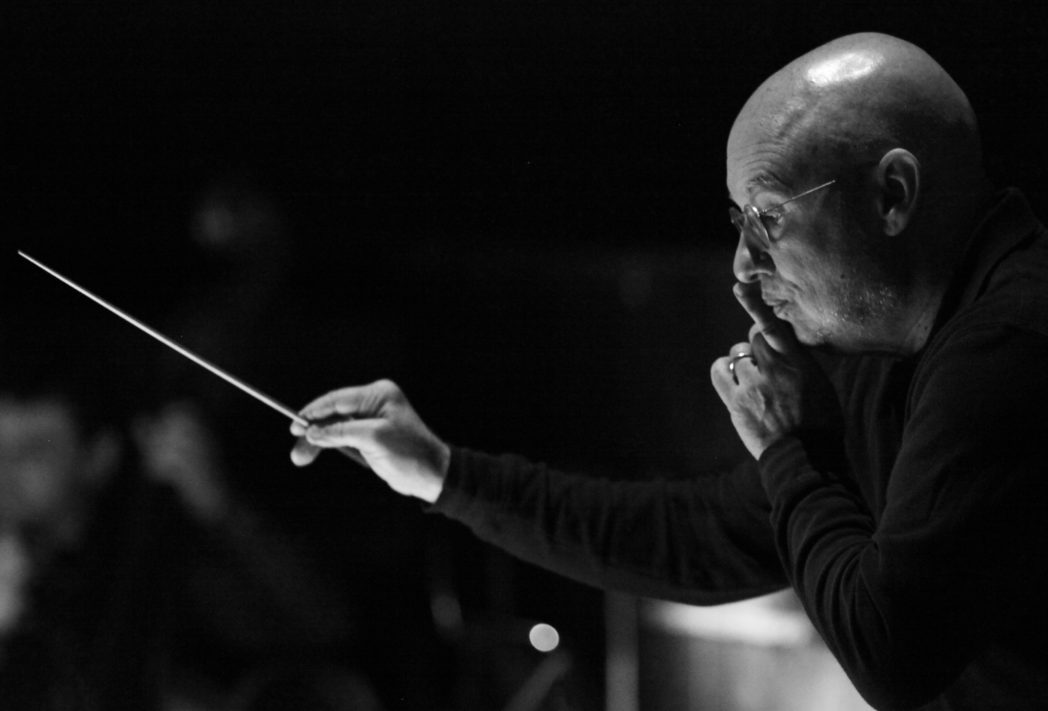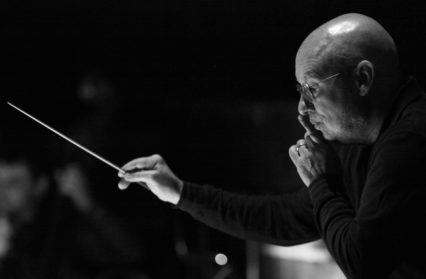Continental European orchestras have returned to touring after Covid. Nigel Jarrett was at St David’s Hall, Cardiff, to hear the Brno Philharmonic Orchestra under its American conductor, Dennis Russell Davies.
Post-pandemic celebrations could have been no more welcome than those for the Brno Philharmonic Orchestra’s visit to Cardiff. International orchestras are on the move, and sooner than anyone thought likely. But the task of restoring audience numbers to pre-pandemic levels are evidently ongoing and having to cope with other, home-grown, difficulties.
The name ‘Brno’ is synonymous among Welsh music lovers with the Czech composer Janáček, who was responsible at the end of the 19th century for promoting the need for a Czech orchestra when nationalism was blossoming as an extension of Romanticism. The present band was formed in 1956 as an amalgam, and American Europhile Dennis Russell Davies has been its artistic director and chief conductor for four years.

The Welsh connection is that Janáček has long been a favourite and a speciality at Welsh National Opera. This autumn a new production of The Makropulos Case was premièred in Cardiff and earlier in the year the company revived Katie Mitchell’s searing production of Jenůfa. For this concert the thoughtful Davies included Janáček’s short symphonic poem Jealousy (Žárlivost), written first as an introduction to Jenůfa but superseded by a shorter prelude notable for its mimicking of the water wheel in the opera’s mise-en-scène and its lurch toward awful revelation. The poem has become a depiction in sound of the character Laca, turned into the proverbial green-eyed monster when his girlfriend Jenůfa switches amorous attentions to his half-brother.
In terms of the large forces needed to perform it, jealousy does seem to have been ripped from a wider canvas, which would justify its deployment. This bout of jealousy has a specific context yet goes straight to the core of its composer’s visceral style. Davies revealed it by attacking the music without stinting on its combination of lyricism and steel-sharp detail or the sonata structure and themes on which it skids to a recap. Compare that with Vaughan Williams’s Fantasia on a Theme of Thomas Tallis, no doubt included by Davies as a mark of respect in the composer’s 150th anniversary year. The string orchestra’s separate – and ideally separated – constituents work best in the work’s original cathedral setting (Gloucester, 1910); but Davies, with only nominal logistics on the platform, opted for something respectful, solemn and personal in what will always be a form of adaptation when the spaciousness of a more lofty venue is out of reach.
Laura van der Heijden was the soloist in Martinů’s ‘Cello Concerto No 1’, as compelling an advocate as one could wish for its sharp contrast between the energetic and the spiritually reflective. For all the outer vitality of the opening and final movements, it’s the soloist who steers everything into the central tranquillity and pacifies its two anguished interjections. The trick is for the cello to be always on top of the music and Davies allowed that, even though there were moments when the pace was pushing the soloist to the limit of her ability to ride the tempo.

Martinů’s music was banned by the Nazis, which post-war made it the subject of intense Czech pride of possession. The way such ownership often works was demonstrated by Davies and the orchestra in Dvořák’s New World Symphony (No 9) in a performance with all the nuance but none of the excess it often generates. It’s a commonplace that the American character of the music is ambiguous despite its Americanisms. Davies set his own boundaries, which confirmed it as more Bohemian than American, especially in the recall of ideas and themes, the dynamic shifts of mood and tempo, and the Czech dance and folk elements – all of it reflecting the symphony’s formal European setting rather than its American emblazon. The playing everywhere was faultless, its direction from the podium bound by a clear sense of shape and cultural affinity.
Nigel Jarrett is a regular contributor to Wales Arts Review. He won the Rhys Davies Prize and the Templar Shorts Award, both for short fiction. His sixth book, a fictional memoir, is Notes From the Superhorse Stable; it appeared this year from Saron Publishers. His fourth story collection, Five Go to Switzerland, will be published this autumn by Cockatrice Books. Jarrett, a former daily-newspaperman, is now a freelance arts critic and also writes for Acumen poetry magazine, Nation.Cymru, Jazz Journal and others. He lives in Monmouthshire.



 Enjoyed this article? Support our writers directly by buying them a coffee and clicking this link.
Enjoyed this article? Support our writers directly by buying them a coffee and clicking this link.







